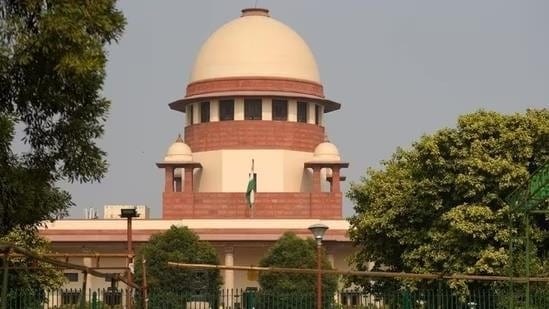The Supreme Court will hear on Friday a plea filed by a group of college students against a Bombay high court judgment that upheld a ban on wearing hijab, niqab, burqa, caps and similar attire at a private college in Mumbai.

A bench comprising justices Sanjiv Khanna and PV Sanjay Kumar will take up the plea following a frequent request by the petitioners’ lawyer, advocate Abiha Zaidi, for an expedited hearing due to the term examination that began on Thursday.
On Thursday morning, Zaidi mentioned the matter before Chief Justice of India (CJI) Dhananjaya Y Chandrachud, expressing the predicament of students who would not be able to sit for their tests due to the instructions on the dress code. The CJI informed the lawyer that the matter was already assigned to a bench that would hear it on Friday.
The case involves NG Acharya & DK Marathe College in Mumbai, which prescribed a dress code prohibiting students from wearing hijab, niqab, burqa, stoles, caps and similar items on campus. Nine female students challenged this dress code before the Bombay high court but to no avail.
On June 26, a Bombay high court bench of justices AS Chandurkar and Rajesh S Patil refused to entertain the students’ plea, stating that the dress code’s enforcement was limited to the college premises and did not otherwise affect the petitioners’ freedom of choice and expression.
Hijab row: Why empowerment through education is the only right approach
Following the high court’s decision, the students appealed to the Supreme Court, arguing that the dress code and restrictions on wearing hijab, niqab, burqa and other religious attire on campus violate their fundamental rights.
The petitioners contended that the dress code, which mandates that students’ attire be formal, decent, and not indicative of any religion, is arbitrary and discriminatory. They argued that the college’s order infringes on their right to choose their attire, their right to privacy, and their freedom of expression under Article 19(1)(a), as well as their right to freedom of religion under Article 25 of the Constitution.
At the core of the dispute is the clash between the state-mandated restriction on religious attire in educational institutions on the ground of maintaining public order and uniformity, and the constitutional rights of individuals to freely exercise their religious beliefs and free speech and expression – a larger issue still to be decisively determined by the Supreme Court.
In October 2022, the top court delivered a split verdict on the ban of wearing of the hijab in educational institutions in Karnataka – with one judge affirming that the state government is authorised to enforce a uniform in schools and the other calling the hijab a matter of choice that cannot be stifled by the state.
Justice Hemant Gupta (since retired), in his judgment, dismissed all the appeals filed against the Karnataka high court judgment, which held in March that wearing of the hijab by Muslim women is not mandatory in Islam and that the Karnataka government was empowered to enforce the uniform mandate.
However, justice Sudhanshu Dhulia at that time differed from the senior judge on the bench and allowed all the appeals. Reading out the operative part of his judgment, justice Dhulia said that wearing of the hijab is a matter of choice for a Muslim girl and there cannot be any restriction against it. Quashing the state government’s prohibitory notification, justice Dhulia added that concerns regarding the education of a girl child weighed the most on his mind and the ban on the hijab would certainly come in the way of making her life better.
In view of the dissenting views, the matter was referred to the CJI for constituting an appropriate bench. The larger bench, however, has not been notified even as the matter remains pending.
The extensive hearing in the Karnataka case witnessed almost two dozen senior lawyers arguing over a spectrum of issues on behalf of girl students, Islamic bodies, rights groups, lawyers and activists. The petitioners, challenging the Karnataka high court order of affirming the ban, covered in their arguments the right to practice religion, freedom to dress as a matter of expression and identity, right to access education and alleged unreasonableness of the state’s mandate. On the other hand, the Karnataka government countered the petitioners, maintaining throughout the proceedings that their circular to enforce the uniform was religion-neutral and aimed only at promoting uniformity and discipline in educational institutions of the state.


